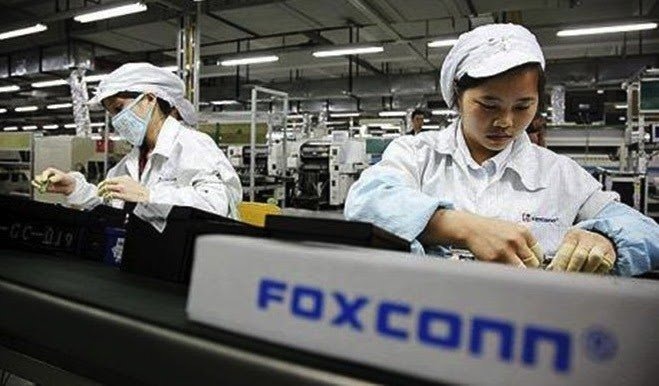Apple manufacturing partner Foxconn has yet to decide whether or not to proceed with plans to jointly invest in a $7 billion facility in the U.S., with Chairman Terry Gou expressing concerns over government incentives, supply chain issues, and a shortage of skilled labor in the country.
Speaking at an event commencing the construction of a new display panel production facility in southern China, Chairman Gou revealed he had returned from a visit to Washington, D.C., reports Nikkei, though it was not confirmed whether he had met officials in the Trump administration.
Gou questioned whether government officials were capable of attracting foreign investors in a short timeframe. Major projects, such as the proposed Apple-Foxconn facility that relies heavily on investment from overseas, could be put at risk if the government is considered by investors as too slow to be helpful in completing such deals.
"I am concerned as to whether the U.S. can resolve all the investment issues in only a few months' time," said Gou. "Does the U.S. offer incentive programs for foreign investors? They'll need to pass bills first, and we'll need to wait for American authorities to make a decision first."
"I am concerned as to whether the U.S. can resolve all the investment issues in only a few months' time" - Foxconn chairman Terry Gou
Gou also claimed the U.S. lacked the supply chains and skilled labor required for display panel production, which would be the main focus of the proposed facility. A lack of a skilled workforce and the inability to acquire materials would give the U.S. a considerable disadvantage when attempting to attract investment, whereas China's existing manufacturing industries already have the supply chains and the eager workforce in place.
Despite the drastically different manufacturing environments, Gou is still keen to work with both the United States and China for production, and does not wish to "see a trade war happen" between the two. "I am not willing to choose between [the U.S. and China], why should I give up on any market?"
The chairman does still hope the "top two economies in the world" can work together peacefully. "I can forsee that the two will eventually work together to grow [their] economies and deliver beneficial outcome for many. If they don't, then everyone will be losers."
The Apple-Foxconn facility in the U.S. is believed to potentially create between 30,000 and 50,000 jobs, with the higher cost of production thought to be a better option than paying to import display panels from China. A second molding plant is also on the cards, with Pennsylvania thought to be a possible location for the facility.
The talks of increased manufacturing in the U.S. is likely to be a response to campaign promises of President Donald Trump, to increase domestic job opportunities by driving companies to manufacture goods in the country, including Apple. Part of the campaign involved threats to make it more expensive for companies to import their goods from abroad, including Mexico and China, while also hinting at concessions on land and electricity, as well as tax, to encourage home-grown production efforts.
Other Apple suppliers have also expressed an interest in bringing manufacturing to the United States, because of Trump's policies. Sharp, owned by Foxconn, and chip maker Taiwan Semiconductor Manufacturing Co (TSMC) have also been linked to potential manufacturing investments.
 Malcolm Owen
Malcolm Owen







-m.jpg)






 Charles Martin
Charles Martin
 Christine McKee
Christine McKee
 Wesley Hilliard
Wesley Hilliard

 Andrew Orr
Andrew Orr
 William Gallagher
William Gallagher
 Sponsored Content
Sponsored Content








32 Comments
Lol @ the notion of the USA lacking "skilled labor"
when they were hiring children off the street for a long time.
I Smell fear. How dare the USA bring back a product economy that benefits its people!
To be correct, much of what we're reading about manufacturing coming to the USA was being discussed for years. So sure, the publicity of Trump's statements is being used, but in reality, Gou has been talking about this possibility for at least three years, and has equivocated about it for the same reasons he's now giving, as well as lawsuits he's worried about here.
the main reason why some manufacturing has been coming back here, as well as new manufacturing, is pretty simple. As costs rise in China faster than they are here, manufacturers are looking at a way to broaden their manufacturing base out of the country. In fact, a major Chinese auto manufacturer is building a plant here to manufacture cars to sell here, for the first time, but to also ship back to China. This plant was planned back two years ago, and is being built. I assume that Trump will take credit for it.
The US can't compete with China and other nations that pay extreme lowly wages and have horrible working conditions (many of those conditions that violate local labor laws). The sheer size of their skilled force and the portability of that force gives them a huge advantage that can't be duplicated in the US.
This problem has been long in the making and we are too shortsighted in our responses. When our educational systems need to be fined tuned, they are being undermined and hampered.